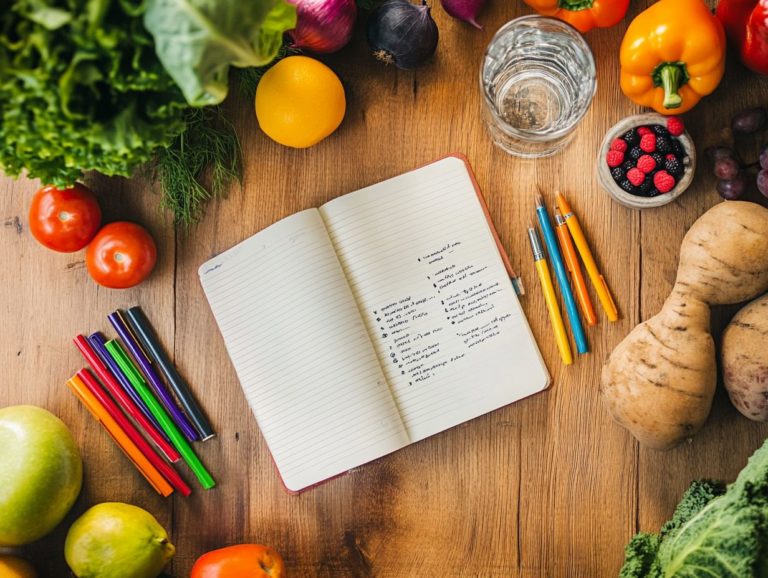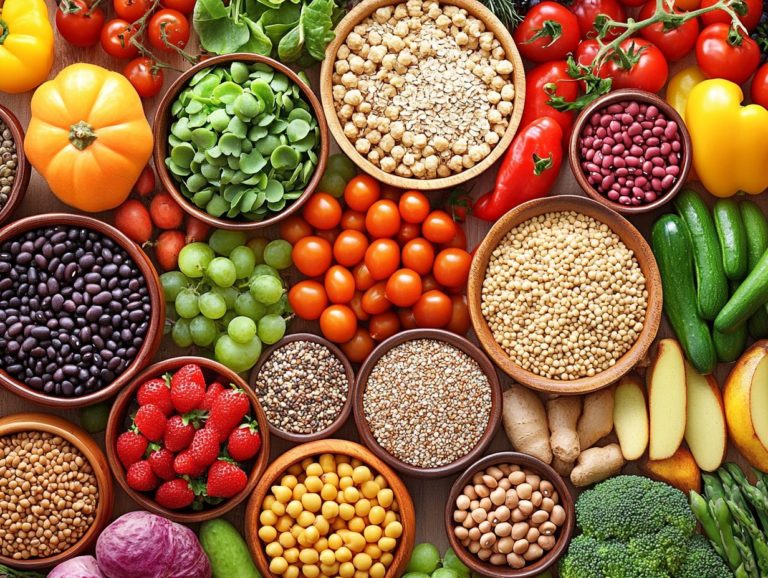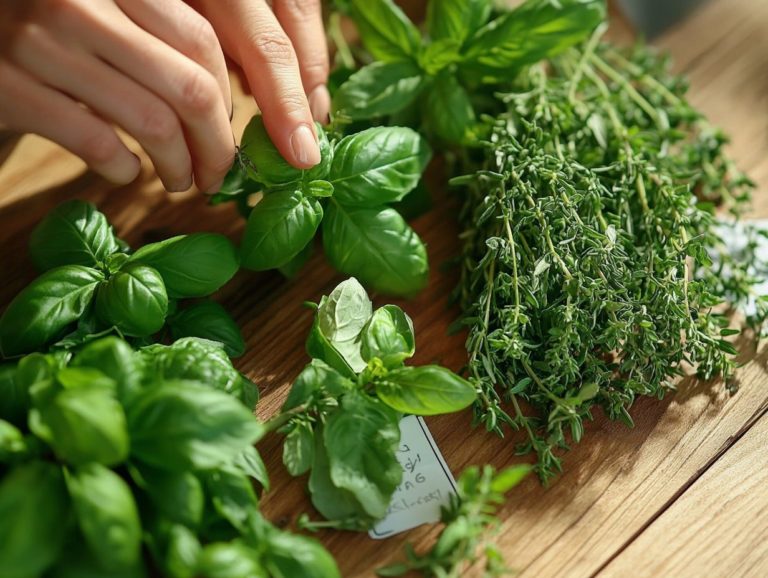How to Stay Hydrated in Different Seasons?
Staying hydrated is essential for maintaining optimal health, yet it’s something that often slips through the cracks in our daily routines.
Hydration plays a crucial role and is influenced by various factors that dictate your water needs.
It s essential to adapt your hydration strategies as the seasons change. From the sweltering heat of summer to the dry chill of winter, practical tips can keep you refreshed and healthy throughout the year.
Contents
- Key Takeaways:
- The Importance of Staying Hydrated
- Factors that Affect Hydration
- Staying Hydrated in Different Seasons
- Tips for Maintaining Hydration
- Hydration Strategies for Every Season
- Frequently Asked Questions
- How do I stay hydrated in different seasons?
- Why is it important to stay hydrated in different seasons?
- What are some signs of dehydration in different seasons?
- How do I stay hydrated while exercising in different seasons?
- What are some hydrating foods I can incorporate in different seasons?
- Can I drink too much water in different seasons?
Key Takeaways:

- Hydration is crucial for overall health and well-being, regardless of the season.
- Environmental factors and physical activity levels play a significant role in determining our hydration needs in different seasons.
- To stay hydrated in different seasons, adjust your water intake according to the temperature, humidity, and your level of physical activity.
The Importance of Staying Hydrated
Staying hydrated is absolutely vital for maintaining your optimal health. It plays a pivotal role in supporting essential bodily functions, such as regulating your body temperature, promoting digestion, and enhancing nutrient absorption.
Proper water intake is crucial for preventing dehydration and the myriad adverse effects it can have on your health, such as weakening your immune system and causing fatigue.
The Mayo Clinic highlights that adequate hydration not only boosts your physical performance but also significantly contributes to mental clarity and your overall sense of well-being.
Why Hydration is Essential for Overall Health
Hydration is essential for sustaining your overall health. It helps maintain the balance of bodily fluids and supports important processes like circulation, digestion, and temperature regulation.
When you stay adequately hydrated, you’re enhancing your immune system’s functionality, allowing your body to fight off illnesses more effectively. Well-hydrated cells function optimally, which is crucial for nutrient absorption and waste removal.
To boost your hydration habits, consider these tips:
- Carry a reusable water bottle with you!
- Set regular reminders to drink throughout the day!
- Infuse your water with fruits for a refreshing twist!
Don t forget the importance of consuming hydration-rich foods, such as fruits and vegetables. They can significantly contribute to your overall fluid intake and promote better health outcomes.
Factors that Affect Hydration
Several factors play a crucial role in determining your hydration levels. Environmental conditions, your personal activity levels, and the dietary choices you make can all significantly influence your overall hydration and, by extension, your health.
Environmental Factors

Environmental factors, like temperature and humidity, significantly influence your hydration needs, particularly during the warm summer months when your body craves more water due to increased sweating.
On the flip side, the chilly winter months can easily mislead you into underestimating your hydration requirements, as the cold air often dulls your sense of thirst. Even if the urge to hydrate wanes in colder climates, your body s hydration needs remain essential.
It s crucial to adjust your water consumption to align with seasonal changes. In summer, ramping up your fluid intake is vital, focusing on water-rich foods such as fruits and vegetables.
In winter, think about incorporating warm herbal teas and broths to boost your hydration while also keeping cozy. By staying aware of these seasonal shifts, you can maintain optimal hydration and support your overall health.
Start your hydration journey today! Drink more water and feel the difference!
Physical Activity Levels
Engaging in physical activity significantly ramps up your body’s demand for hydration. It s essential to increase your water intake to replenish lost fluids and maintain optimal performance.
Knowing your hydration needs can make a big difference in your performance! Your need for fluids is directly influenced by the intensity and duration of your exercise. During workouts especially in hot or humid conditions sweat loss can lead to dehydration, negatively affecting your physical capabilities, endurance, and overall well-being.
Keep a close eye on your hydration levels before, during, and after your workouts. Aim for at least 17-20 ounces of water two hours prior to activity. Incorporate drinks that replace important minerals lost through sweat to enhance your recovery.
Establish a hydration schedule and drink water regularly. Also, include foods that help you stay hydrated like fruits and vegetables to ensure your body stays adequately fueled for peak performance.
Staying Hydrated in Different Seasons
Maintaining proper hydration year-round requires you to adapt to the nuances of seasonal changes. As environmental conditions shift, adjust your hydration strategies to consistently meet your water intake needs.
Summer
Stay hydrated this summer! Here s how to do it: During warm months, keeping yourself hydrated is crucial, as soaring temperatures can lead to increased perspiration and a greater risk of dehydration.
Ramp up your water intake aim for at least eight glasses a day, or more if you re spending time outdoors. Incorporate water-rich foods like cucumbers, watermelon, and oranges into your diet to boost hydration levels.
If you find yourself engaging in intense physical activity, sip on electrolyte drinks to replenish lost minerals. For some, hydration IV therapy might be the game-changer, especially if they re feeling dehydrated. By blending these strategies, you ll find that maintaining adequate hydration during the summer becomes effortless.
Winter

Winter can be deceptive! The cold often hides the signs of dehydration, leading you to underestimate your hydration needs, which can affect your overall health and well-being.
As the mercury dips, your body may not signal thirst as effectively, resulting in lower water intake than necessary. This can trigger issues ranging from fatigue to diminished cognitive function.
To counteract this, incorporate warm beverages like herbal tea or light broth into your routine. These can help maintain adequate hydration levels without the discomfort of the cold. Even coffee, when enjoyed in moderation, can positively contribute to your daily fluid intake.
It s essential to remain vigilant and prioritize hydration, ensuring that you feel your best even during the coldest months.
Spring/Fall
During the transitional seasons of spring and fall, your hydration needs may fluctuate due to varying temperatures and humidity levels, making it essential to adjust your water intake accordingly.
As leaves begin to bud and temperatures start to drop, consistently monitor your hydration levels. Many people underestimate their water needs during these times, especially when cooler weather diminishes the urge to drink.
To ensure adequate hydration, make a conscious effort to:
- Consume water regularly
- Carry a reusable bottle
- Incorporate fruits and vegetables with high water content into your meals
With activities ramping up during these vibrant seasons think outdoor sports or gardening it becomes crucial to adjust your water intake. Pay attention to your body s signals, like thirst or fatigue, to help maintain excellent hydration practices throughout spring and fall.
Tips for Maintaining Hydration
Implementing effective hydration strategies is essential for maintaining optimal water intake and preventing dehydration, regardless of the season or your unique lifestyle.
Stay alert and keep sipping! Your body will thank you.
Hydration Strategies for Every Season
Tailoring your hydration strategies for each season can boost your water intake and support your overall health.
Understanding the unique challenges of each season is key to effective hydration. In the summer heat, high temperatures and more activity can lead to rapid fluid loss. Focus on drinking electrolyte-rich beverages along with plain water.
Winter’s dry air can easily cause dehydration. Prioritize warm herbal teas and soups to keep hydrated.
During spring and fall, changing temperatures can complicate hydration. Listen to your body’s needs and adjust your fluid intake accordingly.
Set realistic hydration goals, like aiming for half your body weight in ounces of water daily. Also, include refreshing fruits and vegetables in your diet to boost hydration.
Frequently Asked Questions

How do I stay hydrated in different seasons?
Drink more water in hot seasons and enjoy warm drinks like tea or soup in colder months.
Why is it important to stay hydrated in different seasons?
Staying hydrated is essential for your overall health and well-being. Different seasons mean different hydration needs, which help maintain proper bodily functions and prevent dehydration.
What are some signs of dehydration in different seasons?
Signs of dehydration to watch for include thirst, dry mouth, dark urine, fatigue, and dizziness. Pay attention to these signs and increase your water intake as needed.
How do I stay hydrated while exercising in different seasons?
Stay hydrated by drinking water before, during, and after your workouts. In hot weather, consider sports drinks with minerals to replenish any lost electrolytes.
What are some hydrating foods I can incorporate in different seasons?
Hydrating foods include watermelon, cucumbers, tomatoes, oranges, and soups. These foods have high water content and can help you stay hydrated in addition to drinking water.
Can I drink too much water in different seasons?
Yes, it is possible to drink too much water, especially in hot weather. This can lead to water intoxication, which can be dangerous. Remember to listen to your body’s thirst signals and avoid excessive amounts of water.






